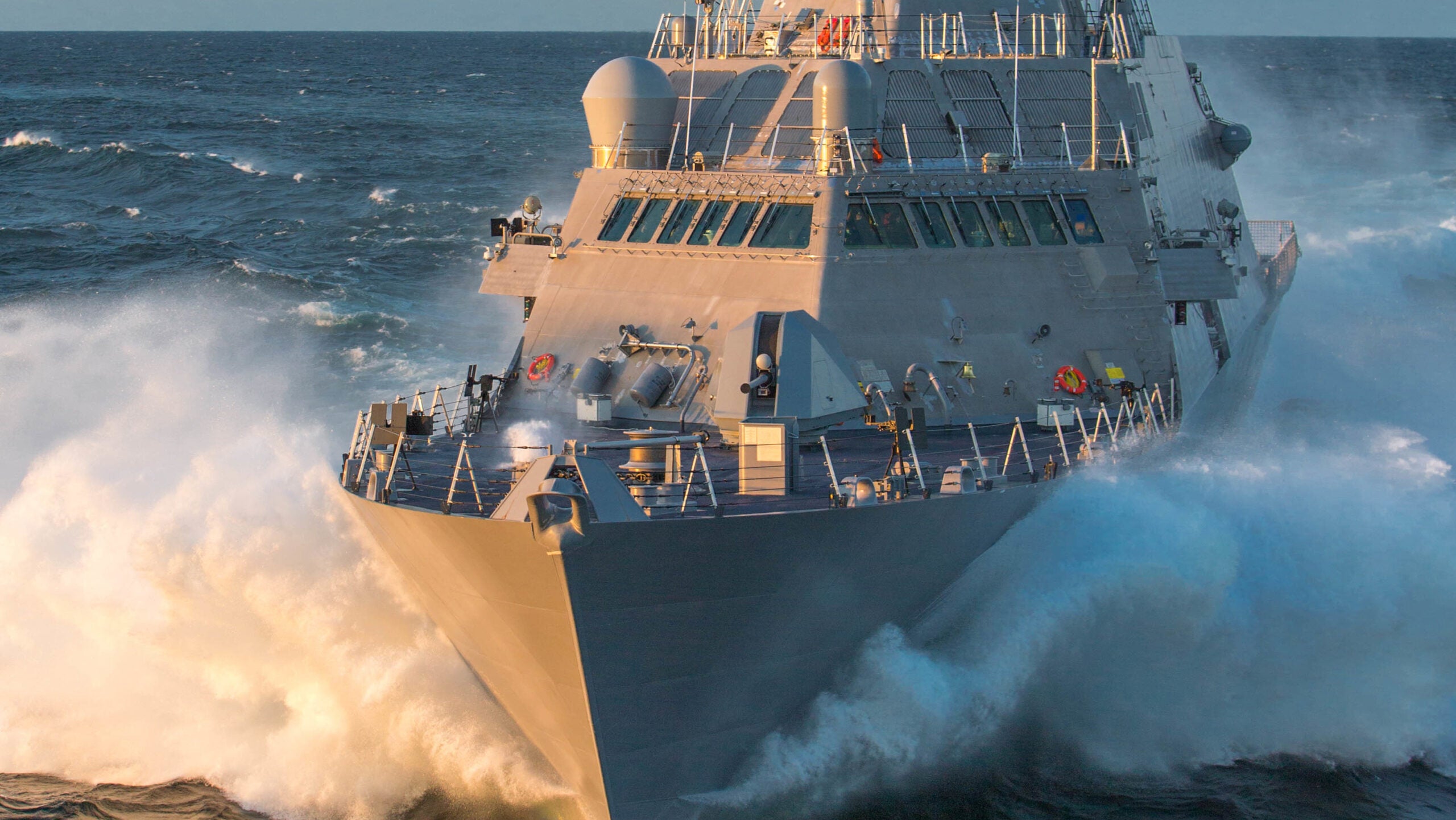Naval Sea Systems Command (NAVSEA) announced yesterday that the U.S. Navy had taken delivery of the future Minneapolis-St. Paul (LCS-21), a Freedom-class littoral combat ship (LCS). The vessel’s delivery was delayed principally because of problems with a part of its drivetrain known as the combining gear, an issue that has affected the entire class. Chief of Naval Operations Admiral Mike Gilday recently called the combining gear problems as “the most challenging engineering problem that we’ve seen on any class of ship since I’ve been in the Navy,” but the service is hopeful that the fix implemented on this particular vessel will eventually solve the issue for the whole class.
Minneapolis-St. Paul was originally scheduled to be commissioned in spring 2021, but the Navy stopped accepting new Freedom-class LCSs in January until the fix could be developed. The redesigned gear will now be retrofitted onto the other Freedom-class ships still in service. At the Navy League’s Sea Air Space symposium in August, LCS Deputy Program Manager Howard Berkof told
USNI News that it would likely take two years to repair all the ships. The problematic gear is located deep inside the hull.
The USS Milwaukee (LCS-5), Sioux City (LCS-11), Wichita (LCS-13), Billings (LCS-15), Indianapolis (LCS-17), and St. Louis (LCS-19) should all receive the fix. The class’s namesake, Freedom (LCS-1), was decommissioned at the end of September and will join the reserve fleet. Three other early ships in the class — USS Fort Worth (LCS-3), Detroit (LCS-7), and Little Rock (LCS-9) — are scheduled to be decommissioned next March. Congress has not yet authorized those decommissionings, though, so the other older ships’ repair status is uncertain.
Any that are decommissioned seem very unlikely to receive the redesigned gear, however, since saving money on repairs was the Navy’s primary rationale for the early retirements. Fort Worth actually suffered a combining gear breakdown in 2016 and today is equipped with a gear that is different from any of the other Freedom class ships in commission.
The combining gear is an important part of the design of the Freedom class’ propulsion system. These ships use a combined diesel and gas (CODAG) system, which pairs diesel engines with gas turbines. In a typical CODAG system, during normal cruise operations, the diesels run the propulsion system, but the gas turbines can provide a high-speed boost when needed. It is a fairly common arrangement on ships — the U.S. Coast Guard’s Sentinel-class national security cutters use CODAG systems, for example. But unlike most Navy and Coast Guard ships, the Freedom class does not have traditional propellers. Instead, the engines power a waterjet system. For the Freedom class, the top speed on combined engines is supposed to be greater than 40 knots. On diesel engines alone, the ship is limited to about 10 to 12 knots.

The internal-combustion diesel engines produce power by turning at one set of speeds, while the Rolls Royce gas-turbine engines turn at others. It requires a combining gear to match speeds. This gear has been plagued from very early on with problems in its bearings — devices that keep shafts turning smoothly and limit excess vibration. Defense News’ Megan Eckstein has reported that the new combining gear replaces ball bearings with journal bearings.
USNI News
reported yesterday that Navy Rear Admiral Casey Moton, who heads the Program Executive Office, Unmanned and Small Combatants, which manages the LCS program, told reporters the Navy is now working to install the new gear on the Cooperstown (LCS-23). Cooperstown, the next ship in the Freedom class, is scheduled to be delivered in January. The following three ships in the class — the future Marinette (LCS-25), Nantucket (LCS-27), and Beloit (LCS-29) — will also get their combining gear replaced. The final ship, the future Cleveland (LCS-31), was just laid down in June and will receive the new gear design in the ordinary course of construction.
Getting the Freedom class back to work at full speed is vital to the Navy, with the combining gear being just the latest in a litany of expensive problems. Both this class and the catamaran-hull Independence class have been testing a variety of weapons to give the little ships some big bite. But none of that matters if transmission problems keep them tied up at the pier. The Navy has not yet announced a commissioning date for the Minneapolis-St. Paul, but if the new gear works as promised, it should be soon. And then the ship named for Minnesota’s Twin Cities can join the other Freedom class ships in their homeport at Mayport, Florida, and get to work.
Contact the author: Brian@Thedrive.com.
